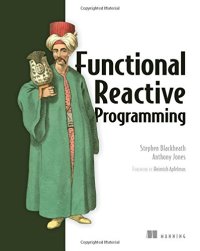
Ebook: Functional Reactive Programming
Author: Stephen Blackheath Anthony Jones
- Year: 2016
- Publisher: Manning Publications
- Edition: 1
- Language: English
- pdf
Summary
Functional Reactive Programming teaches the concepts and applications of FRP. It offers a careful walk-through of core FRP operations and introduces the concepts and techniques you'll need to use FRP in any language.
Purchase of the print book includes a free eBook in PDF, Kindle, and ePub formats from Manning Publications.
About the Technology
Today's software is shifting to more asynchronous, event-based solutions. For decades, the Observer pattern has been the go-to event infrastructure, but it is known to be bug-prone. Functional reactive programming (FRP) replaces Observer, radically improving the quality of event-based code.
About the Book
Functional Reactive Programming teaches you how FRP works and how to use it. You'll begin by gaining an understanding of what FRP is and why it's so powerful. Then, you'll work through greenfield and legacy code as you learn to apply FRP to practical use cases. You'll find examples in this book from many application domains using both Java and JavaScript. When you're finished, you'll be able to use the FRP approach in the systems you build and spend less time fixing problems.
What's Inside
- Think differently about data and events
- FRP techniques for Java and JavaScript
- Eliminate Observer one listener at a time
- Explore Sodium, RxJS, and Kefir.js FRP systems
About the Reader
Readers need intermediate Java or JavaScript skills. No experience with functional programming or FRP required.
About the Authors
Stephen Blackheath and Anthony Jones are experienced software developers and the creators of the Sodium FRP library for multiple languages. Foreword by Heinrich Apfelmus. Illustrated by Duncan Hill.
Table of Contents
- Stop listening!
- Core FRP
- Some everyday widget stuff
- Writing a real application
- New concepts
- FRP on the web
- Switch
- Operational primitives
- Continuous time
- Battle of the paradigms
- Programming in the real world
- Helpers and patterns
- Refactoring
- Adding FRP to existing projects
- Future directions